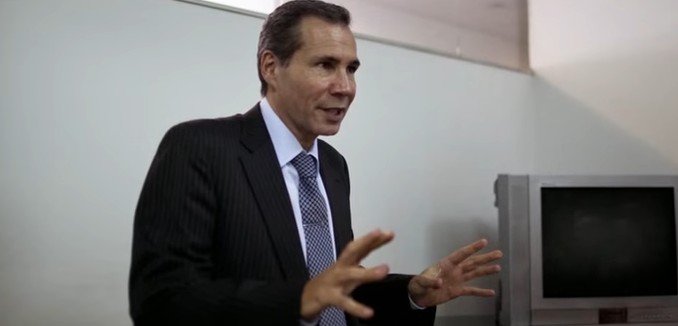One year after the body of Argentine federal prosecutor Alberto Nisman was found in suspicious circumstances in his Buenos Aires apartment, the judge in charge of investigating his death has summoned two members of Nisman’s security detail for questioning.
Judge Fabiana Palmaghini is examining whether Federal Police may be implicated in the death of Nisman, who had spent nearly a decade pursuing the six Iranian suspects in the 1994 bombing of the AMIA Jewish center in the Argentine capital, one of the worst single anti-Semitic atrocities since World War II. Palmaghini was appointed to lead the investigation into Nisman’s own death following the historic victory of the centrist candidate, Mauricio Macri, in last November’s presidential election.
Armando Niz and Luis Miño, the two Federal Police officers called in by Palmaghini, were supposed to collect Nisman from his home at 11:00 AM on January 18 last year—almost twelve hours before his body was finally discovered. Nisman had been due to unveil before Argentina’s Congress his extensive complaint against the government of then-President Cristina Fernández de Kirchner, charging that she used a 2013 pact with Iran to cover up the Tehran regime’s culpability for the AMIA atrocity.
According to the Buenos Aires Herald, Palmaghini is attempting to establish “whether the Federal Police (PFA) vacated the area [around Nisman’s apartment building] to allow somebody to kill the prosecutor,” as alleged by Nisman’s former wife, Sandra Arroyo Salgado, who is also a federal judge. Palmaghini is conducting similar inquiries with the AFI, Argentina’s murky Federal Intelligence Agency. The contention that Nisman was murdered is being taken very seriously by officials in the new Macri government, among them Laura Alonso, the head of the Anti-Corruption Office.
Palmaghini’s renewed efforts on Nisman’s death came as the newly-appointed official in charge of the AMIA investigation called for the Iranian suspects to be tried in absentia.
Mario Cimadevilla, a lawyer and former senator from the moderate-Left UCR party, was named as head of the AMIA investigation unit within the Ministry of Justice on Jan. 13. “All my efforts will be addressed to clarifying the most abominable terrorist attack that our country has ever suffered,” Cimadevilla said. “There will be cooperation and ongoing support for justice; the Argentinian society as a whole needs inexorably to know the truth.” It is unclear how the activities of his unit will relate to those of the Special Prosecutor, a position yet to be filled in the wake of Nisman’s demise.
Cimadevilla’s proposal for a trial in absentia was welcomed by the DAIA, the representative body of Argentina’s Jews.
These latest developments around both the Nisman death and AMIA investigations will likely fuel speculation that another outcome of this renewed activity will involve Fernández de Kirchner’s foreign minister, Héctor Timerman, facing possible charges of treason. In an article for the latest edition of The Tower magazine, contributing editor Eamonn MacDonagh noted that President Macri had abandoned Fernández de Kirchner’s “attempts to fight a court ruling that the pact with Iran was unconstitutional.”
Added MacDonagh:
Whether Macri wants to spend any of his remaining political capital on efforts to have [Nisman’s] death investigated in a serious way is not entirely clear. But there are signs of movement, starting with the government’s message to Interpol concerning its “firm determination to maintain in force the international capture orders issued by the Argentine legal authorities, essential for the resolution of the AMIA case.”
The “capture orders” refer to outstanding international arrest warrants for Iranian officials including former Iranian deputy defense minister Ahmad Vahidi, former minister of intelligence Ali Fallahijan, and Mohsen Rabbani, an attaché at the Iranian embassy in Buenos Aires at the time of the AMIA bombing.




